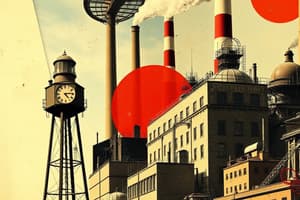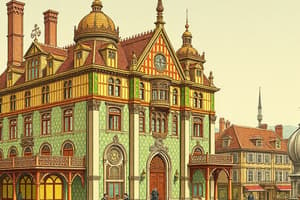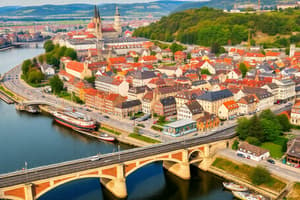Podcast
Questions and Answers
What impact did the Industrial Revolution have on Western economics, politics, and society?
What impact did the Industrial Revolution have on Western economics, politics, and society?
- It led to the rise of factory system and mass production, improving economic output but worsening working conditions (correct)
- It had no impact on Western economics, politics, and society
- It led to the decline of industrialization and the rise of agriculture-based economies
- It resulted in decreased economic output and political instability
What was a significant consequence of the demand for cheap labor during the Industrial Revolution?
What was a significant consequence of the demand for cheap labor during the Industrial Revolution?
- Children were put to work in factories, leading to demands for labor reforms (correct)
- The demand for cheap labor decreased and led to an increase in wages
- Workers were provided with safe working conditions and reasonable hours
- The demand for cheap labor had no impact on industrial practices
Where did the Industrial Revolution initially begin?
Where did the Industrial Revolution initially begin?
- Spain
- Germany
- England (correct)
- France
What major change did the factory system bring about during the Industrial Revolution?
What major change did the factory system bring about during the Industrial Revolution?
How did the Industrial Revolution impact economic, social, and political reforms?
How did the Industrial Revolution impact economic, social, and political reforms?
What demand eventually arose as a result of long hours and dangerous working conditions during the Industrial Revolution?
What demand eventually arose as a result of long hours and dangerous working conditions during the Industrial Revolution?
What term refers to the greatly increased output of machine-made goods that began in England in the middle 1700s?
What term refers to the greatly increased output of machine-made goods that began in England in the middle 1700s?
Who invented the seed drill in 1701?
Who invented the seed drill in 1701?
Which country won freedom from France and became an independent country of Haiti in 1804?
Which country won freedom from France and became an independent country of Haiti in 1804?
Who published The Communist Manifesto in 1848?
Who published The Communist Manifesto in 1848?
Which emperor began his reign in China in 1735?
Which emperor began his reign in China in 1735?
In what year did the Suez Canal open in Africa?
In what year did the Suez Canal open in Africa?
Who became czarina of Russia in 1762?
Who became czarina of Russia in 1762?
What did James Watt build in 1765?
What did James Watt build in 1765?
'Dream of the Red Chamber' was published by whom in 1791?
'Dream of the Red Chamber' was published by whom in 1791?
In what year did British unions win the right to strike?
In what year did British unions win the right to strike?
During the Industrial Revolution, children were not put to work in factories due to labor laws protecting them.
During the Industrial Revolution, children were not put to work in factories due to labor laws protecting them.
The factory system introduced a variety of problems for people living and working during the Industrial Revolution.
The factory system introduced a variety of problems for people living and working during the Industrial Revolution.
The Industrial Revolution began in England and quickly spread to other countries.
The Industrial Revolution began in England and quickly spread to other countries.
The industrialization that started in Great Britain did not spread to other parts of the world.
The industrialization that started in Great Britain did not spread to other parts of the world.
The Industrial Revolution did not lead to economic, social, and political reforms.
The Industrial Revolution did not lead to economic, social, and political reforms.
The demand for cheap labor during the Industrial Revolution did not lead to demands for reform.
The demand for cheap labor during the Industrial Revolution did not lead to demands for reform.
Prior to the Industrial Revolution, people wove textiles by hand and machines began to do this and other jobs.
Prior to the Industrial Revolution, people wove textiles by hand and machines began to do this and other jobs.
The Industrial Revolution began in England in the middle 1700s and lasted until about the middle 1800s.
The Industrial Revolution began in England in the middle 1700s and lasted until about the middle 1800s.
The enclosure movement in England had two important results: landowners tried new agricultural methods, and large landowners formed labor unions.
The enclosure movement in England had two important results: landowners tried new agricultural methods, and large landowners formed labor unions.
The Agricultural Revolution involved wealthy landowners buying up the land of village farmers and enclosing it with fences or hedges.
The Agricultural Revolution involved wealthy landowners buying up the land of village farmers and enclosing it with fences or hedges.
The increase in landholdings due to the enclosure movement enabled landowners to cultivate larger fields and experiment with more productive seeding and harvesting methods.
The increase in landholdings due to the enclosure movement enabled landowners to cultivate larger fields and experiment with more productive seeding and harvesting methods.
The complete version of Cao Zhan’s 'Dream of the Red Chamber' was published in 1791.
The complete version of Cao Zhan’s 'Dream of the Red Chamber' was published in 1791.
The Industrial Revolution spread from England to continental Europe and North America.
The Industrial Revolution spread from England to continental Europe and North America.
The Industrial Revolution brought about a different type of revolution that transformed the way people worked.
The Industrial Revolution brought about a different type of revolution that transformed the way people worked.
The Industrial Revolution refers to the greatly increased output of machine-made goods that began in France in the middle 1700s.
The Industrial Revolution refers to the greatly increased output of machine-made goods that began in France in the middle 1700s.
The Industrial Revolution paved the way for modern industrial societies and had no impact on subsequent developments.
The Industrial Revolution paved the way for modern industrial societies and had no impact on subsequent developments.
Flashcards are hidden until you start studying





